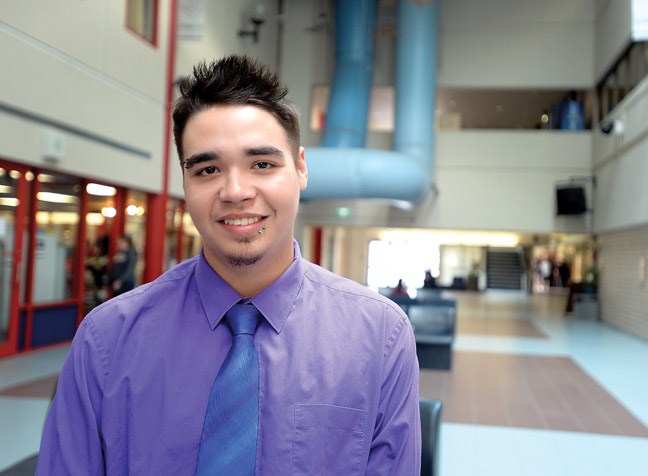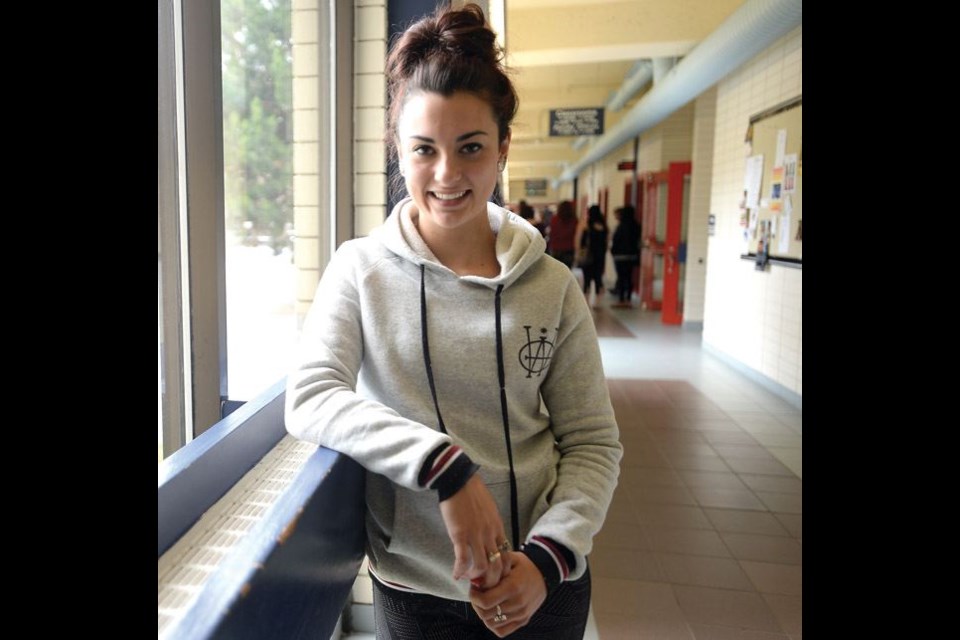Callista Vogt's classroom looks like it's decorated for an end-of-the-year party. Colourful paper cutouts are taped high along the wall and strung from the ceiling.
Penned on a pink star, Danika Rode's name sits above the "Math 11" scrawled underneath. Hers is a name among hundreds, all students who have passed through the Transitional Alternate Program Secondary (TAPS) program offered at the Centre for Learning Alternatives.
On Wednesday, Rode was one of 75 students who walked across the stage for the shcool's valedictorian ceremony. She finished her last year of high school in the small portable nestled between buildings at the College of New Caledonia. It was the first year she liked learning, and it was the first year she truly succeeded with her education.
"The school really changed me as a person," says the 18-year-old.
She felt an immediate difference in her relationships with teachers - respect was a mutually earned experience - and they cared about her success.
"They look more behind the lines than what you see in the classroom," she says, and also understand progress is the point. "You're human and you'll make mistakes.
"It's just the environment. I felt like I was wanted here," says Rode, calling "Callista" an awesome person and pointing to the crazy drawings that line the classroom walls as a departure of the look she was used to.
All students call Vogt by her first name, a subtle reminder she treats them as adults who can make their own choices.
"This program allows you a lot more time and space to create relationships," Vogt says. "That's what works."
It's the very basis of everything, Vogt says, but a connection that can be difficult to achieve in classes of 30. The TAPS classes max out at 20, but there are often fewer in her classroom on the day-to-day. It used to be that students couldn't refer themselves to TAPS, but that's changed and with it an acknowledgment that some students struggle in a mainstream environment and thrive with a different approach.
"People always saw it as the bad-kid school," she says. "We really are an alternative way of learning."
"It's becoming more of a (source of) pride to say that I come here."
Trying TAPS, an idea Rode's mom pushed when she saw how unhappy her daughter was, gave her confidence and pushed Rode to start thinking of the future.
"I wouldn't have known I was capable," says Rode, and that would have had an impact on the rest of her life. Now, she's looking into taking a photography class at CNC.
That's the process Vogt never tires of witnessing. She always has students who believe they can't learn, pointing to past report cards.
"They realize that they are academically capable," says Vogt, who teaches Math 11, Socials 11, First Nations Studies 12 and any number of self-paced classes depending on the students.
Use common language, she recommends, remembering her own eyes glazing over and hearing "white noise" when the teacher intoned about numerators and denominators.
The CLA also purposely starts classes later, after 9 a.m. That's key, says Vogt, citing research that shows the teenage brain doesn't perform well in the morning. A 2014 study from Brown University looked at sleeping patterns and supported recommendations for later school start times.
All these approaches, Vogt says, lead to a learning experience where "the students want to be here."

For Reese Peck, going to the CLA at the John McInnis Centre, was a new beginning. After he was expelled from Terrace's only high school in Grade 10, his family moved to Prince George. Someone recommended J-Mac as Peck calls it, where he finally felt he fit in.
"They're more street-smart. They've gone through things," he says, adding the students support each other.
At Tuesday's rehearsal, the 19-year-old was dressed in a bright purple shirt and tie. He was also wearing an unmistakable grin at his accomplishment.
"I'm pretty proud," he admitted, also crediting the diploma for getting him through the second round of interviews for a job at a lumberyard.
His sentences run together as Peck considers all the things he could see himself becoming: a paramedic, a security guard, heavy-duty mechanic. For now he's focused on getting a job to support his one-month-old baby, but more seems possible now that he's more than passed his courses. It wasn't until he started getting good grades in English that he realized the school was really working for him. In his old school, he had a nine per cent completion rate in that course.
"I wasn't applying myself," he says.
Now he's become a voice for younger kids, telling them what he didn't want to hear just a few years ago.
"After you just buckled down, it's worth it. It's just such a good sense of accomplishment."


